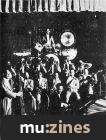Magazine Archive
Home -> Magazines -> Issues -> Articles in this issue -> View
That Celebrated, Cultivated, Underrated Nobleman... The Juke | |
Article from Sound International, January 1979 | |
Or... the cover that never was. But that's another story. Instead why not leaf through to 46, give your eyes a treat and find out who put the Ola in Rock.

Prime designs of the two giants, Wurlitzer and Rock-Ola. More than 10000 of the Wurlitzer Peacock were manufactured and it was probably the most luxuriant of all. The Rock-Ola 1426 was made in 1947.
Did any other boxes even incorporate America's tail-finned fantasy-or-bust dime-a-dream mentality so gloriously? Could Tutti Frutti ever sound quite the same coming from a mere hi-fi system?
John Krivine's book Juke Box Saturday Night, a giant mutated softback (13½in x 9½in) from which these pictures are taken, does the decent thing by the jukes, bringing them from the coffee bar to the coffee table.

Two more Forties sweethearts — the Filben Maestro (above) and the Wurlitzer 800.
At the same time, Krivine provides a useful social history which is comprehensive and shatters a number of much-loved juke box myths.
Far from springing full-grown from some rock'n'roll designer's head, the juke box had a long and gradual history. In 1890, the Louisiana Phonograph Company found that one of its machines in Missouri had taken $1000 in a couple of months. In the next decade bootleg records became relatively big business.
And I bet you thought that when juke boxes and rock did come together in unholy union, they naturally invented obvious cash-in names like Rock-Ola. Wrong again, David C Rockola was born together with his name long before musical connotations attached to it, and was involved in juke boxes by the thirties. Even his hyphen was there simply to avoid mispronunciation.
It's also a fact that Rockola's two main engineers of the thirties rejoiced in the names Burnham and Swaggard. But names can be misleading: another popular assumption about juke box history, the close ties to organised crime, is also somewhat exploded by Krivine: 'One has a sneaking suspicion that the myth of the Mob in juke boxes is fostered by those pillars of society who would prefer it not to be generally known that in reality, the Mob, if anywhere, is everywhere.'
A couple more useful facts: in 1941, over half the records sold went to juke boxes; by 1953, the first all-45rpm juke boxes were on sale.
Some favourite characters: Seeburg salesman Stewart S. Stone (with a dollar sign through the middle S) who used to throw his hat in the corner of the joint and declaim 'I guarantee you fifty dollars a month for that space', and Sam and Lili, the two sad old music-hall entertainers who a Sheffield salesman recalls being moved on from one pub after another as he brought in the new gleaming jukes.
Now it's the boxes that have had their day, and in most cases they've been replaced by nothing more imaginative than muzak. But the real stars of the book shine on: some look like washing machines, some like art deco lifts, some like Cadillacs. The best of them look like Robby the robot from Forbidden Planet somehow had a child by Jayne Mansfield.

Tearaway teens get sent to the tunes of the 2600.
Juke Box Saturday Night is published by New English Library price £3.95. SBN 450 03189 6.
More with this topic
Relics With Relish - Hard Rock History |
Six Great Moments In Sound History |
 In The Airwaves - John Morrish listens to the radio |
That Was Then But This Is Now |
Grafton Vintage Sax - Alto Saxophone |
Mellow and Full Bodied |
African Guitar |
Overtones |
 Bass Out Of Time - Bass Slate |
Talkin’ All That Jazz |
Out Of Africa |
Overtones |
Browse by Topic:
History / Culture
Publisher: Sound International - Link House Publications
The current copyright owner/s of this content may differ from the originally published copyright notice.
More details on copyright ownership...
Feature by Rob Mackie
Help Support The Things You Love
mu:zines is the result of thousands of hours of effort, and will require many thousands more going forward to reach our goals of getting all this content online.
If you value this resource, you can support this project - it really helps!
Donations for May 2024
Issues donated this month: 0
New issues that have been donated or scanned for us this month.
Funds donated this month: £0.00
All donations and support are gratefully appreciated - thank you.
Magazines Needed - Can You Help?
Do you have any of these magazine issues?
If so, and you can donate, lend or scan them to help complete our archive, please get in touch via the Contribute page - thanks!














